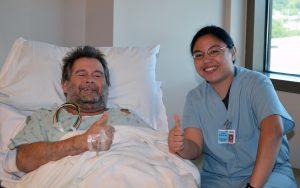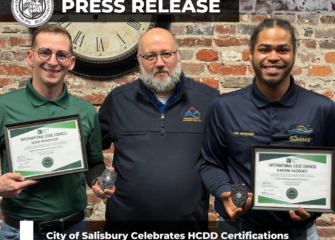
Barney Morris, 46, of Dagsboro was sitting in a meeting when suddenly his vision went black and white. He could still hear the people around him, but they sounded fainter and fainter. His chin stuck to his chest as if he had whiplash.
“I knew something was wrong, something serious,” Morris said. He struggled to his car and laid in the back. His girlfriend drove him home at his insistence – “I was hoping it was just a bad headache that would pass,” he admitted.
But after an hour of lying down at home with no relief from the disorienting and painful symptoms, he called his girlfriend at work and she drove him to the hospital.
He went to Atlantic General, where the emergency room suspected a devastating diagnosis: a ruptured aneurysm in his brain. They transferred him quickly to Peninsula Regional Medical Center, where neurosurgeon Sophia Shakur, MD, was ready to help. That night – Tuesday, July 10 – she performed an angiogram that revealed Morris did have a ruptured aneurysm.
“It’s very serious,” Dr. Shakur explained. “One-third of people with a ruptured aneurysm don’t even make it to the hospital. Of those who survive, half have neurological deficits. It has to be treated within the first 24 hours.”
A brain aneurysm is a weak spot in a vein or artery that can gradually fill up like a balloon. It can occur for many reasons, including family history and high blood pressure. Morris had both – his mother has two small aneurysms and he has struggled to control his blood pressure.
When an aneurysm bursts, the consequences can be devastating – much like a stroke, it can be instantly deadly, or can cause physical and cognitive problems.
On Wednesday morning, Dr. Shakur performed Peninsula Regional’s first coil embolization of the rupture. Rather than opening his skull to repair the damage, she snaked a tiny catheter wire through an artery in his groin and sealed off the affected area, ensuring there were no clots that could further cause problems.
Peninsula Regional has the only hybrid OR in the region that combines medical imaging and surgical equipment to allow for minimally invasive brain surgery, with scans during the procedure. The closest comparable facility is in Philadelphia. It opened in February of his year – and it was fortunate for Morris, who didn’t have to be transferred to a distant hospital for this timely treatment.
“He’s very lucky,” Dr. Shakur said. “He is doing very well.”
In fact, Morris suffered no long-lasting damage from the burst aneurysm. The effect that will stay with him is acquired wisdom.
“I knew I had high blood pressure,” he said. “I wasn’t listening to my doctor; I didn’t take my medicine.”
Morris says that has all changed – the aneurysm was a serious wake-up call. He is taking medicine to control his high blood pressure, and has quit his two-pack-a-day smoking habit. He still has a ways to go on his road to recovery – as a construction worker, he needs to be able to be active. He is being carefully monitored – the ruptured aneurysm can cause vascular spasms that can result in a stroke, especially in the weeks after the event.
“All I can do is hope and keep pushing forward,” Morris said. “But I have come a long way from when I came in here.”
Morris said he is grateful to Dr. Shakur, a Salisbury native who recently returned home after her medical education at Johns Hopkins and a fellowship in neurosurgery at the University of Chicago. “I can’t thank her enough for saving me,” he said. “The world needs more people like her.”



